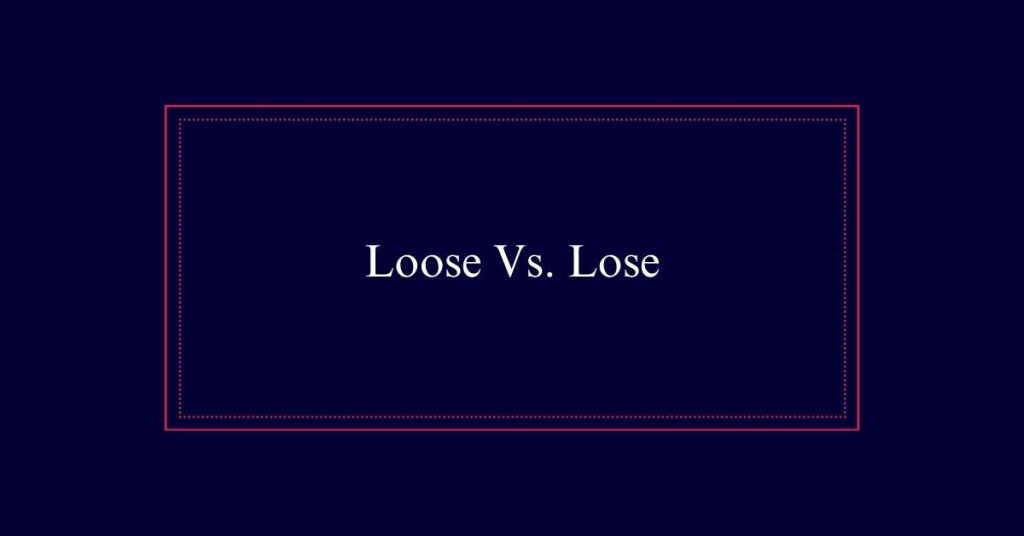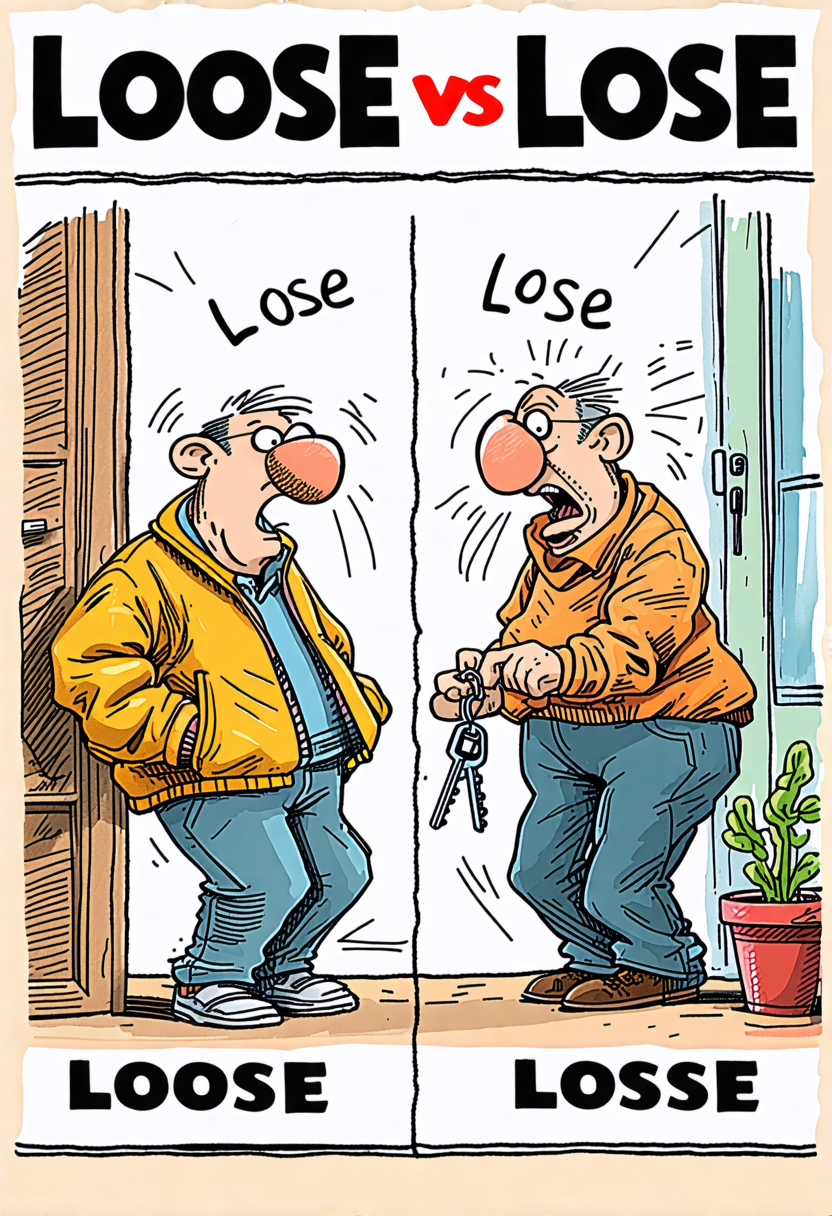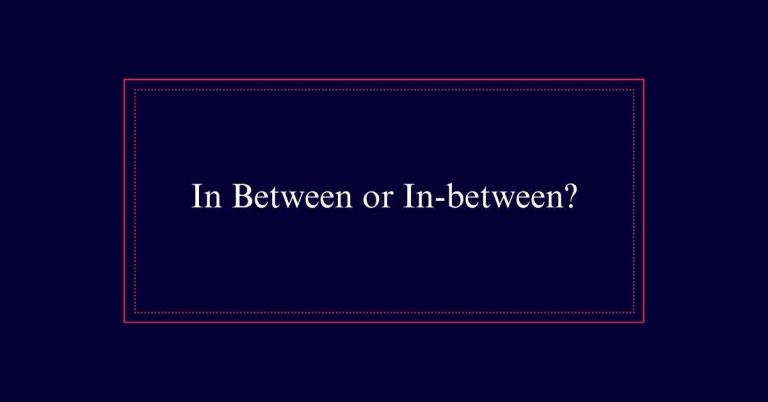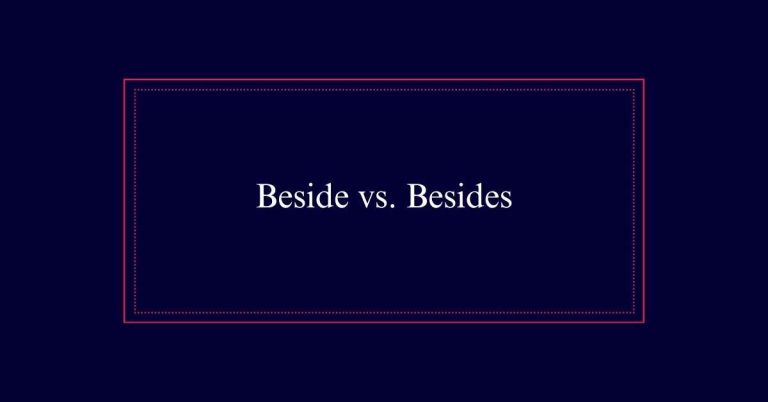Loose Vs. Lose
‘Lose’ and ‘loose’ are often confused but have distinct meanings. ‘Lose’ means to no longer have something, to fail to win, or to become unable to find something. For example, ‘I hope we don’t lose the match.’ ‘Loose’ describes something not tightly held or attached, as in, ‘The screw is loose.’ To remember the difference, think of losing the extra ‘O’ in ‘loose’ for ‘lose.’
Definition of ‘Lose’
What does it mean to ‘lose’?
In the English language, ‘lose’ functions as a verb with several meanings. To start with, it can mean to fail to win a competition or a game. For example, ‘The team did not play well and ended up losing the match.’
Additionally, ‘lose’ can refer to being unable to locate something, such as in ‘I always seem to lose my keys.’
Finally, it can indicate the act of no longer having something, like in ‘She will lose her job if she keeps coming in late.’
In all these instances, ‘lose’ conveys the idea of a loss or a failure to retain, find, or win something.
Definition of ‘Loose’
While ‘lose’ is often associated with the concept of loss, ‘loose’ carries a different meaning entirely. ‘Loose’ is an adjective that describes something not tightly attached or held. It implies a lack of strictness or precision. When something is ‘loose,’ it may be easily moved or changed. This word is often used in various contexts to convey flexibility or slackness.
To make this clear:
- Clothing: A loose shirt is comfortable and not tight.
- Objects: A loose screw needs tightening.
- Control: Loose regulations allow more freedom.
- Speech: Loose language lacks precision.
- Animals: A dog running loose is not restrained.

Common Uses of ‘Lose’
People frequently use the verb ‘lose’ to describe situations where something is misplaced or no longer possessed. For example, one might say, ‘I lose my keys often,’ indicating the keys are frequently misplaced.
Another common use is in the context of an emotional or physical setback, such as, ‘I lose motivation during busy weeks,’ meaning motivation is no longer felt.
Additionally, ‘lose’ is used in competitive scenarios, like sports or games. For instance, ‘Our team might lose the match,’ suggests the possibility of not winning.
The verb can also refer to the loss of personal items, such as, ‘He will lose his wallet if he is not careful.’
Common Uses of ‘Loose’
Many common uses of ‘loose’ relate to objects or conditions that are not firmly fixed or tightly bound. This term often describes items that lack tightness or rigidity, making them easily movable or adjustable.
Here are some typical contexts where ‘loose’ is used:
- Loose clothing: Garments that fit comfortably without being tight.
- Loose change: Coins that are not organized in a wallet or container.
- Loose ends: Unresolved details or unfinished tasks.
- Loose soil: Earth that is not compacted, making it easier to dig.
- Loose tooth: A tooth that is not firmly anchored, often a sign of impending loss.
Examples of ‘Lose’
‘Lose’ is a versatile verb used in various contexts to convey the idea of something being misplaced, forfeited, or no longer possessed. For instance, one might lose their keys, signaling that they cannot find them. Similarly, a team might lose a game, indicating they did not win. Additionally, a person can lose weight, meaning they have reduced their body mass. Here are some examples to illustrate the use of ‘lose’:
| Context | Example Sentence |
|---|---|
| Misplace | “I often lose my glasses.” |
| Forfeit | “The team is likely to lose the match.” |
| No longer possess | “She aims to lose ten pounds by summer.” |
Examples of ‘Loose’
A ‘loose’ screw can cause a piece of furniture to wobble. The term ‘loose’ indicates something is not tightly fastened or firmly held in place. This word can be used in various contexts, illustrating its versatility. Here are some examples:
- A ‘loose’ knot may come undone easily.
- Wearing ‘loose’ clothes can provide more comfort during hot weather.
- The dog got out through a ‘loose’ fence board.
- A ‘loose’ tooth might eventually fall out.
- The ‘loose’ pages of a book might get lost.
Mnemonics for ‘Lose’ and ‘Loose’
To distinguish between ‘lose’ and ‘loose,’ mnemonics can be incredibly useful tools. One effective mnemonic is to remember that if you “lose” the extra ‘O’ in ‘loose,’ you end up with ‘lose.’ Another helpful technique is to visualize ‘loose’ as having an extra ‘O,’ making it looser or more open than ‘lose.’
Here’s a quick comparison:
| Word | Mnemonic |
|---|---|
| Lose | Lose the extra ‘O.’ |
| Loose | Loose has an extra ‘O’ (more open). |
Visual Tricks
One effective visual trick is to imagine the word ‘loose’ as having an extra ‘O,’ making it appear wider and more open. This visual representation can help you remember that ‘loose’ indicates something not tight or secure.
Meanwhile, ‘lose’ with a single ‘O’ seems more compact, signifying loss or deprivation.
To further aid in distinguishing these words, consider the following tips:
- Picture ‘loose’ as a loose-fitting garment.
- Envision ‘lose’ as dropping or losing an item.
- Think of ‘loose’ like a loose knot.
- Imagine ‘lose’ as losing a game.
- Visualize ‘loose’ as loose soil.
Practice Sentences
Practice sentences can effectively enhance your ability to differentiate between ‘lose’ and ‘loose.’
Using these words in context helps solidify their meanings. For example, consider the sentence: ‘If you lose your keys, you might be late.’ Here, ‘lose’ indicates misplacing something.
In contrast, ‘My shoelaces are loose’ shows that ‘loose’ describes something not tight.
Another useful sentence is: ‘You don’t want to lose the match because your shoelaces are loose.’ This sentence uses both words correctly, reinforcing their distinct meanings.
Practice creating similar sentences to build your understanding. Regularly writing and reviewing these sentences can make it easier to remember which word to use in different situations.
Frequently Asked Questions
Can ‘Lose’ Ever Be Used as an Adjective or Noun?
The word ‘lose’ is never used as an adjective or noun. It functions solely as a verb, meaning to misplace, fail to win, or cease to have something. For adjective, use ‘lost’; for noun, use ‘loss.’
Are There Any Idioms That Use ‘Lose’ or ‘Loose’?
Yes, idioms using ‘lose’ include “lose your temper” and “lose track of time.” For ‘loose,’ examples are “cut loose” and “play fast and loose.” These idioms convey specific actions or states of being.
How Is ‘Lose’ Conjugated in Different Tenses?
Lose” is conjugated as follows: present tense – lose (I lose), past tense – lost (I lost), past participle – lost (I have lost), present participle – losing (I am losing). These forms cover different temporal contexts.
Do ‘Lose’ and ‘Loose’ Have Any Synonyms?
Both ‘lose’ and ‘loose’ have synonyms. For ‘lose,’ synonyms include ‘misplace,’ ‘forfeit,’ and ‘surrender.’ For ‘loose,’ synonyms include ‘slack,’ ‘unfastened,’ and ‘untied.’ Remember their distinct meanings to use them correctly.







